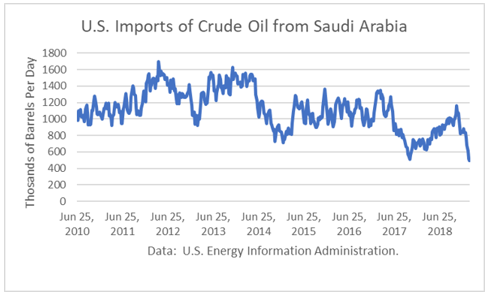On October 20, 1973, Saudi King Faisal announced KSA was joining in an oil embargo against the United States and Europe in favor of the Arab position in the Yom Kippur War. In an interview with international media, King Faisal said:
“America's complete Israeli support against the Arabs makes it extremely difficult for us to continue to supply the United States with oil, or even remain friends with the United States."
The price of oil quadrupled in short order, a few months. The oil shortage in America was managed by gasoline rationing by President Nixon. Drivers could buy gasoline on “odd” or “even” days, depending on the last digit of their license plate. There was also a maximum dollar amount set on purchases of $10. Motorists often had to wait in line for an hour to buy gas.
The economic impact on the U.S. and the world economy was devasting. It caused a massive recession in 1974-75, even though the embargo was lifted in March 1974. The Saudis and other OPEC producers learned how “inelastic” (i.e., non-responsive to price) gasoline demand was and their ability to stuff their coffers even with small cuts to production.
However, this episode led to legislation to build the Strategic Petroleum Reserve (SPR) as a means to offset future supply disruptions and even deter them. At present, the SPR contains roughly 650 million barrels of crude oil located in underground salt domes across the Gulf Coast.
The drawdown capacity is rated at 4.4 million barrels per day. And supplies can begin flowing into the pipeline system with 13 days of a presidential order to commence.
Saudi’s Mini Oil Embargo
Saudi Arabia appears to be attempting to starve the US of oil supplies in a “mini-embargo.” The idea would be to signal to the world that oil supplies are lower than otherwise would be reported internationally.

In the week ending February 22nd, imports from Saudi Arabia totaled 346,000 b/d, the lowest one-week level in the data series going back to 2010. The four-week trend of 491,000 b/d was also the lowest, and 23 percent lower than a year ago. This level does not even meet the requirements of Saudi Aramco’s Motiva refinery at Port Arthur, Texas, which has a capacity of 636,500 b/d.
Despite the lack of Saudi barrels, U.S. crude stocks have nevertheless built by 4.4 million barrels since the end of December. That is because crude production is 1.9 million barrels per day higher in the year-to-date v. last year. “Other supplies,” primarily natural gas liquids are 536,000 b/d higher in that same comparison. Meanwhile, net crude imports, including exports, were 1.877 million barrels per day lower in the year-to-date v. last year. Crude inputs to refineries were 89,000 b/d higher in that same comparison.
Trump Tweet
President Trump warned OPEC on February 25th:
“Oil prices getting too high. OPEC, please relax and take it easy. World cannot take a price hike - fragile!”
The Saudi mini-embargo to the U.S. may backfire by angering him. It would be a simple matter to replace Saudi imports altogether with a drawdown from the SPR until U.S. production rises another 500,000 b/d. Furthermore, the U.S. could replace Saudi barrels with imports from other sources, Iraq for example.
Conclusions
The Saudi ploy to drain U.S. crude inventories in support of oil prices is doomed to failure. U.S. domestic supply has risen greatly, and the net import need has dropped dramatically in the past year. The demand for OPEC’s oil is projected to drop by 1.0 million barrels per day in 2019. In 2020, the EIA projects that the U.S. will be a net oil exporter.
Furthermore, it could backfire if Trump calls for the NOPEC legislation – No Oil Producing and Exporting Cartels Act - to be passed. The House Judiciary Committee approved the bill.
America's vulnerability to Saudi embargoes has long passed.
Check back to see my next post!
Best,
Robert Boslego
INO.com Contributor - Energies
Disclosure: This contributor does not own any stocks mentioned in this article. This article is the opinion of the contributor themselves. The above is a matter of opinion provided for general information purposes only and is not intended as investment advice. This contributor is not receiving compensation (other than from INO.com) for their opinion.
